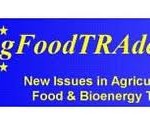Roberto Ridolfi of EuropeAID acknowledged the impact of IFPRI's and CGIAR's work in addressing many global development challenges, "What makes the CGIAR different from the academic world is the fact that we plug research into action, into impact."
European Commission
The European Commission (EC) has been committed to ensure food and nutrition security, resilience to food crises, and agricultural development. Since 2006, the EC has committed €1 billion every year to strengthen and support global food security and sustainable agriculture. Over the years, the EC’s strong support to IFPRI provided the necessary foundation for cutting-edge research in areas such as climate change; biofuels; and the nexus of agriculture, nutrition, and health. In addition, it has helped IFPRI team up with strategic European partners in civil society, higher education, and public sector areas, with a focus on making food security research accessible through the development of global public goods, capacity-building networks, and technological platforms.
Highlights of IFPRI’s collaboration with the EC can be found in this brochure.
Understanding Trade Liberalization in a Changing World: AgFoodTrade
IFPRI’s AgFoodTrade program comprised a series of research projects that built upon existing knowledge, data, and models to address issues relating to international trade and trade negotiations.
Assuring Food and Nutrition Security in Africa by 2020
In 2004, IFPRI facilitated an all-Africa conference, bringing together more than 500 actors and stakeholders from 50 countries to deliberate on how to bring about change and action to assure food and nutrition security.
Taking Action for the World’s Poor and Hungry People: A 2020 Conference
With the 2015 deadline for the United Nations’ Millennium Development Goals looming, IFPRI facilitated an international policy consultation to identify actions needed to ensure the world’s poorest and hungry people would not be left behind.
West African Agriculture and Climate Change
Maize, millet, rice, and sorghum are the major cereal crops in West Africa, yet yields from these crops are very low compared to the world average and even other regions within Africa. A changing climate will challenge production systems already under pressure to increase output to feed a growing population.


